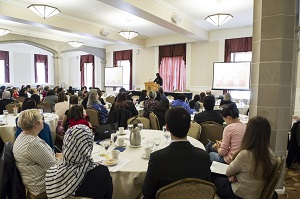
This program aims to create an engagement platform for connecting linguistics to the community, health, and tech industries and ultimately, a hub to house these connections and highlight cross-disciplinary work between the humanities and other disciplines, both in and outside of academia. This envisioned hub will serve as a place where interns, alumni, faculty, staff, community, and industry partners work in a cooperative environment to share knowledge through research and education. The goals of the program are to (1) increase the visibility of linguistics and humanities in general, (2) prepare students for challenging careers, (3) train them in a supportive environment, (4) strengthen Pitt industry partnerships, (5) highlight the value of a humanities education through the promotion of applied opportunities for humanities students, (6) function as a gathering point for faculty, industry partners, and students looking for opportunities to establish collaborative partnerships across disciplines and sectors, (7) organize events for the community, including conferences, small group talks, panels, and think groups, (8) serve as a liaison to both the community and to higher education, and (9) cultivate an interdisciplinary Community of Practice.
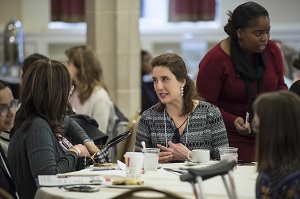
Rationale
The humanities face an uphill battle in the national conversation around improving the employment of college graduates. While internships and job opportunities involving disciplines like science, engineering, medicine, computer science, and business have traditionally been successful, the possibilities for graduates in the humanities have been less obvious. Humanities subjects have many practical applications outside of academia, yet our students do not feel confident in effectively selling their skills in today’s STEM-saturated job market. It is crucial to prepare humanities students to take advantage of growing opportunities in the region. It is equally imperative that medical and other organizations realize the potential contributions of humanities to their projects.
Preparing students for versatile careers is especially important in light of changing trends in employment. Teaching them skills like creativity, critical thinking and collaboration will servethem in almost any job they pursue. We desire to enhance the visibility of the humanities and its important connections with several disciplinary areas across the University, foster collaborative work in research, education, clinical services and other areas of study and to strengthen connections with the wider Pittsburgh community. At the same time, this program presents a nice opportunity to enrich the humanities and outline the diverse ways in which humanities can in fact help us navigate the new reality of our digital age. For instance, the barriers to shifting from computers as tools to computers as dialogue partners who can converse as engagingly as humans, are not only technical but also linguistic. Overall, A humanities perspective is important for life and work, and to create a caring, empathetic, and just community. It improves our understanding of the world that we live in, it supports a culture of curiosity and exploration, increases our chances to solve problems and make new discoveries, helps build socio-linguistically intelligent systems as well as trust with diverse communities we serve, and it is central to the deep examination of our institutions required to foster the inclusion and equity that ultimately translate to wellness for all. All of this is supported by published, peer-reviewed research.
Creativity
From a creativity perspective, the internship program epitomizes “progress through partnerships”. It is a unique and creative approach to a difficult problem, and it additionally encourages creativity in problem solving for interns at their partner organizations as those places may not be used to humanities perspectives. Our program is unique in comparison to others, as, in addition to placing students in diverse experiential opportunities, it also brings all of them together to learn from each other, thereby exposing them to yet even more applications and experiences.
Timing: Opportunity in Pittsburgh & Beyond
Pittsburgh is on a fast track to becoming a new technology hub. This is an ideal time to launch industry partnerships. As Chancellor Gallagher notes, Pitt is located in an increasingly diverse city that has transformed from a metropolis anchored in the steel and coal industries to one known for educational and technology incubator institutions and an internationally recognized health system. Based on the 2014 State of the Industry Report, technology companies employ about 23% of the region’s overall workforce. Pittsburgh, according to an Op-Ed in the Pittsburgh Post-Gazette by President Obama (2016), is a city “that has harnessed innovation to redefine itself as a center for technology, health care and education”. We must think of diverse ways to create a context to prepare our humanities graduates to take advantage of this growing opportunity in our region, and our medical and tech organizations to see the potential contributions of humanities to their fields. Our students at both the undergraduate (e.g. through the Linguistics Internship program) and graduate levels continue, as we speak, to land positions with local and national technology companies as well as in the wider industry.
Alignment with the Pitt Strategic Plan
The purpose of this project is to create infrastructure to foster and sustain greater collaboration and cross-fertilization of ideas and perspectives between the University of Pittsburgh’s many schools, the health industry, and community partners. Our intent is to broaden educational opportunities for students across campus, and facilitate the application of humanities skills, while enhancing opportunities in the marketplace by redirecting them towards diverse engagements with the world (Soudi et al 2019). For faculty, our intent is to inspire and facilitate the growth, expansion, and continuation of vibrant, effective collaborative partnerships.
The University of Pittsburgh is known for its emphasis on the value of humanities and cross-disciplinary work. Furthermore, the goals of this program align with the Strategic Plan for the University of Pittsburgh, especially with regards to the creation of an institutional environment and culture that celebrate interdisciplinary collaborations and team accomplishment, and foster relationships, events, policies, and work that strive for integrative successes.
It is thus crucial to prepare students to profit from these opportunities in our region, and this project hopes to help with that by providing cross-disciplinary experiential learning opportunities for our students.

Graduate and Undergraduate Internship Rotations
The linguistics internship program caters to wards both graduate and undergraduate students.
Undergraduate level: Ling 1900. This course can be taken for up to 2 rotations for a total of 6 credits. Only 3 credits will be counted towards Linguistics major as a capstone or as an elective. Remaining credit will count towards 120 credits required to graduate from the Dietrich School of Arts & Sciences.
Graduate level: Ling 2900 (1-3 credits). Graduate students may take up to 3 internship units to count towards their graduate degree.
We are in the process of working on other credit to accommodate diverse experiential learning opportunities. We are also looking at connecting these experiences to satisfy some general education requirements. More information on this will be available in the future.
This course aims to give linguistics students in-field work experience prior to graduation. Students work with the program’s director to secure an internship in a company of interest and participate in weekly seminar in addition to on-site work. Interested students should contact Soudi, the Internship Program Director and Founder, to plan their rotation. Based on successes, the program has expanded to being offered in both the fall and spring semesters each year. Students can also do internships during the summer and apply credit during fall term. The weekly seminar hosts speakers from diverse industries. Additionally, we have an annual budget which allows us to conduct several social events, conferences, and workshops outside the classroom.
The linguistics internship is currently entering its 9th year (16 rotations). Our initial partners were Semantic Compactions System, M*Modal, Voci Technologies, Magee Women’s Hospital, The ELI, but we have expanded since then to include several others partners as highlighted below. Overall, we have recruited over160 interns over the past 9 years, and many of them have been placed in full-time jobs. Alumni/ae working full-time in the industry sector continue to be an important part of our program providing support for our current interns and students.
Internship Program Alumni (coming soon)
Publications and Conference Presentations (coming soon)
Guest Faculty (check back soon)
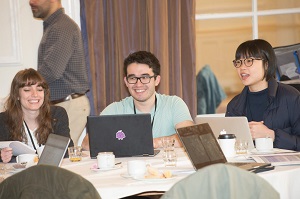
The Pitt Linguistics Internship Program is a pioneer in the country in preparing students for challenging careers where linguistics is part of the solution, training them in a supportive environment, and strengthening Pitt Linguistics-industry partnerships to facilitate the exchange of knowledge through research and education. These internship experiences are highly impactful and play a pivotal role in empowering students to secure employment post-graduation.
However, not all students have uniform access to these opportunities, especially in cases where compensation is not provided, and students may have financial responsibilities to manage. Considering this, we established this Scholarship Fund in 2022 to provide support and broaden accessibility. Your generous donation will not only open doors to these opportunities but also attract a diverse student population to Pitt Linguistics and contribute to the enrichment of our community and academic endeavors.
We extend our heartfelt appreciation to all our donors. Your support has allowed us to provide 9 scholarships:
Fall 2022 Internship Grant Recipients:
- Caiden Dietz
- Mayah Mbangah
- Meghan Bucheral
- Tarna Batelman
Spring and Fall 2023 Internship Grant Recipients:
- Ava Szalla (Undergraduate)
- Nicholas Wixom (Undergraduate)
- Goldie Segol (Graduate)
- Hana Howell (Undergraduate)
- Clio Begnal (Graduate)

Program Sponsors
- 3M
- Cerner Corporation
- David Berg Center for Ethics and Leadership, University of Pittsburgh
- David C. Frederick Honors College
- Department of Family Medicine, University of Pittsburgh
- Department of Linguistics, University of Pittsburgh
- Department of Ob/Gyn & Reproductive Sciences
- Dietrich School of Arts & Sciences, University of Pittsburgh
- Magee Women’s Hospital
- Office of the Provost, University of Pittsburgh, “Year of….Initiative”
- School of Computing and Information, University of Pittsburgh
- School of Education, University of Pittsburgh
- Semantic Compactions Systems
- UPMC Health Plan
Community & Industry Partners, Internship Placement Sites
- 3M/M*Modal
- Astrata, Inc
- Children’s Hospital of Pittsburgh, Community Vitality Collaborative
- Department of Ob/Gyn & Reproductive Sciences (IPV)
- Edge Fearless Learning
- English Language Institute
- Geriatrics, Pulmonary & Critical Care, UPMC (End of Life Discourse)
- Global Wordsmiths
- HCL Google
- Hello Neighbor
- HRW, UK
- Kasisto KAI - Digital Experience Platform
- Language Technologies Institute, Carnegie Mellon University
- Living Tongues
- Magee Women’s Hospital
- Meerkat Village
- Microsoft
- Semantic Compactions Systems
- Semantic Compactions Systems
- The Articulab, Carnegie Mellon University
- The Office of Research, University of Pittsburgh
- Tobii Dynavox
- Voci Technologies
- Wikitongues
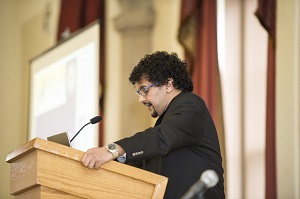
The Humanities in Health (HinH) Program is a cross-unit partnership which includes Linguistics, Education, Business, Medicine and the larger Community. This collaboration originated as a teaching partnership between a Pitt family doctor (Dr. Jeannette South-Paul) and a Pitt linguist (Dr. Abdesalam Soudi) in 2004 who teamed up to design and teach an interdisciplinary cultural competency course for medical and health science trainees followed. This work led to extensive collaborations with Dr. Judy Chang (Magee Women’s Hospital) around topics such as discourse of Intimate Partner Violence (IPV) and the impact of EHRs on doctor-patient conversation.
The team felt that medicine is in dire need of influence from the humanities. Medicine deals not only with the human body, but also with the mind and spirit, and it is therefore essential to adopt a wide humanistic perspective when providing healthcare. Since these human aspects themselves also vary by culture, language, lifestyle, demographics, religion and several other factors, it is even more important to integrate the humanities into medical education in order to train clinicians to provide culturally responsive and sensitive healthcare.
The Family Medicine-Linguistics partnership subsequently expanded to include the Department of ObGyn, the School of Education, the David Berg Center, and the School of Computing and Information at Pitt. The group designs services and events on the topics of Diversity, Cultural Competency, and Health, and provides a platform to highlight collaborations among medical clinicians and researchers and colleagues working in disciplines across the humanities and related fields in and outside academia.
HinH is not only steered by a group of professionally and culturally diverse people, but also appeals to a wide, diverse audience. Participants in past events include students in both the humanities and health sciences, technology engineers, linguists, nurses, physicians, counselors, physician-assistants, nurse practitioners, therapists, public health officials, healthcare policymakers, administrators, and health educators. Importantly, it also includes community members such as patients, refugee and immigrant organizations, the International Patient Center, the UPMC Health Plan, and the UPMC Center for Engagement and Inclusion, as well as researchers involved in community-based care. This unusual diversity of participants increases everyone’s understanding of the populations we are serving and their diverse needs and builds bridges between previously disparate groups.
Most recently, the coronavirus and racial protests have not only prompted conversations about science, medicine, and public health, but have also forced us to look at inequities embedded in our modern society, tying into larger conversations about race, ethnicity, discrimination, and institutionalized racism. Many of us are finally learning how Social Determinants of Health — Where we live, work, grow, and our socioeconomics — can have a huge effect on COVID-19 outcomes. Pandemics have always affected the poor but only now we have begun to see how overlooking the impact of SDOH would severely hinder our efforts to curtail the spread of COVID-19.
To adequately examine and understand these complex topics, it has become clear again that it is necessary to expand beyond clinical and biomedical knowledge and science and solicit expertise and insights offered from students, scholars, and experts in the humanities. The humanities can contribute greatly to technology and medicine in their quest to improve the human condition, but, too often, neither humanities-trained workers, nor those responsible for building these organizations, see this potential resource for workforce growth or enrichment. Additionally, humanities students are not taught to ‘market themselves’ to medical and tech organizations and are led to believe that their areas of study are irrelevant to these fields. It is essential to augment the expertise, and perspectives of other professionals through collaborations with humanities experts.
HinH aims to create infrastructure to foster and sustain greater collaboration and cross-fertilization of ideas and perspectives to promote cross-disciplinary training and research around humanities and health. We design conferences each year to convene experts to work together to discuss the diverse roles humanities plays in health and well-being and to discuss how to make our community safe, diverse, inclusive and healthy for all. These conferences allow several opportunities for networking and help cultivate an interdisciplinary Community of Practice (CofP), which will work to provide support and structure for sponsoring pilot collaborative studies focusing on racism in healthcare or impacts of racism on health. The HinH group works to build resources, research and curricular opportunities, and infrastructure to expand interdisciplinary work between the humanities and other disciplines while creating common ground. For example, in 2019 we organized a panel on working across disciplines which brought together five deans from Pitt to discuss integrative models at Pitt.
We envision this infrastructure will ultimately (1) provide a forum for sharing work from these various partnerships, (2) provide networking resources, (3) nurture and share ideas and information across the entire campus, (4) offer expanded educational experiences for students, (5) expand innovations and ideas regarding improving health and wellness.
We will continue to (1) examine other models of interdisciplinary centers/programs on health that exist or are being developed at other institutions; (2) learn from current Pitt centers and offices that report an interdisciplinary mission; (3) identify interested and motivated faculty and students through interdisciplinary conference and award program that involves networking events and showcasing of finalists; and (4) use key informant interviews, group discussions, and surveys to determine needs and expected outcomes regarding interdisciplinary collaborations. Ultimately, we intend to design sustainable institutional supports needed to encourage, support, and reward interdisciplinary scholarship at the University of Pittsburgh that are accessible, usable, and useful. Community of Practice methodology established in the context of shared practices of academic teaching will deepen and extend possibilities for interdisciplinarity within these practices and will lead to a wider change.
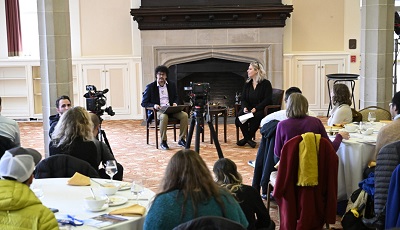
- Humanities @ Work in the Community, Health and Tech Industries: Cultivating Compassion, Civil Discourse, & Embracing the Power of Language (7th Edition, April 12, 2024)
- Special Event: Community United in Compassion (2023)
- Humanities @ Work in the Community, Health and Tech Industries (6th Edition, 2023)
- Engaging Humanities in Health (2021)
- Humanities @ Work in the Community, Health and Tech Industries (1st Installment, 2019)
- Family & Healthy U (2018)
- Cultural and Linguistic Diversity (2017)
- Humanities in Health (2016)